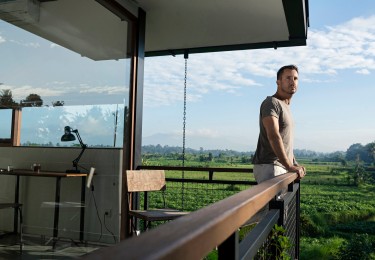
Here comes the sun
A year on from when lockdown began, we can definitely see a light at the end of the tunnel. The question now is, how bright it will be?

Investments | 31 March 2021
HERE COMES THE SUN
A year on from when lockdown began, we can definitely see a light at the end of the tunnel. The question now is, how bright it will be?
-
1
Asset Allocation update
Asset Allocation update
equity



Economic recovery, monetary policy and long-term market trends are positive for equities. We expect corporate earnings to rebound significantly and become the fundamental driver of asset prices.
government bonds



We continue to expect government bonds to underperform equities. However, they provide valuable ballast for funds and portfolios during periods of equity market instability and we topped up our holdings in the first quarter.
corporate bonds



Overall, credit looks unattractive given expensive valuations. We have a low allocation to investment grade bonds but have taken selected positions in areas within credit that still look attractive.
cash



We have put excess cash to work in portfolios while maintaining a reserve to facilitate any buying opportunities that come around as markets adjust.
Changes we made in the first quarter
![]()
sold chinese equities and added to the UK
We banked profits from our position in Chinese companies after a period of good returns. We’ve used some of that money to add to the UK as part of our economic recovery theme – the UK is home to a lot of companies in sectors such as materials, energy and banks that tend to do well as the economy improves.
![]()
Adding to UK gilts, reducing US Treasuries, emerging market bonds, investment grade bonds and gold
We took profit on US Treasuries, which have done well over the last year. Rising bond yields (falling prices) in February and March led us to sell-out of short-duration emerging market bonds, investment grade bonds and gold. The low prices allowed us to opportunistically add to UK gilts at attractive levels - we believe that the Bank of England will keep rates on hold for an extended period, which will support returns.
Portfolio themes
emerging markets
![]()
![]()
A weak US dollar will be positive for emerging markets, and the global economic recovery bodes well for the manufacturing and export-orientated economies that are typical in the sector. Asian countries – which make up around 66% of emerging market equity indices – have also weathered the COVID-19 storm well through swift containment measures.
japan
![]()
![]()
Japanese companies typically have strong balance sheets and have benefitted from very strong government stimulus from the Bank of Japan during the COVID-19 crisis. The greatest source of new exports for Japan has been emerging markets and China in particular – as these economies benefit from global growth and a weaker dollar, we expect prospects for Japanese exporters to improve.
us banks
![]()
![]()
Historically, banks have outperformed the wider market during the recovery phase of the business cycle. Monetary stimulus should reduce the possibility of corporate defaults, protecting banks’ balance sheets, while fiscal stimulus could lead to higher growth and inflation, both of which are typically positive for the banking sector.
UK MID-CAP COMPANIES
AND DIVIDENDS
![]()
The successful UK vaccine programme and high household savings point to a surge in consumer spending as lockdown restrictions ease over the spring. This will be good for smaller, domestic companies, known as ‘mid-cap’ shares. The recovery also heralds a return of dividends, which were heavily cut last year. In particular, banks have resumed dividends following a go-ahead from the regulator.
responsible investing
![]()
Stronger balance sheets, good employment policies and better risk management of highly ESG-rated companies all help to preserve shareholder value during times of economic disruption. Low-carbon tracker funds have reduced exposure to the energy sector, which has suffered from low demand during the lockdown period, and increased exposure to technology, which has benefitted.
Risks in the months ahead
INFLATION CONCERNS
![]()
The pandemic was a disinflationary environment and a return to economic recovery will be accompanied by a rise in inflation. In addition, the economy has support from a sizeable fiscal injection and easy monetary conditions. It is likely that inflation will surpass central bank targets for the period ahead. However, central banks recognise that this is temporary and are unlikely to raise interest rates in the face of it. Nevertheless, markets may over-react and extrapolate from rapidly improving conditions as lockdowns ease.
coronavirus recovery
![]()
With vaccines now approved and being distributed in many countries, a gradual return of ‘business as usual’ seems guaranteed. However, uncertainties remain with respect to vaccine supply, whether they work in the face of new virus variants and questions about whether seasonal boosters are required. These will pose challenges with respect what the ‘new normal’ will look like.
over-optimistic markets
![]()
We still expect a rotation within markets from the pandemic winners into the pandemic losers. But the market has priced in a lot of optimism around vaccine distribution, economic recovery and government fiscal support packages. This brings two potential risks: on the one hand, markets may not have much further to go on the upside, while even mild setbacks could cause markets to fall.
china vs us
![]()
A change in president is unlikely to see any major rapprochement in this simmering rivalry. The mood music will change, and relations are likely to be more congenial on the surface at least, but most of the sore points that existed in 2016 – trade imbalances, intellectual property rights – remain unresolved. Markets have ignored the potential fallout during the COVID-19 pandemic, but as this recedes investors could look again at the risks that a trade war could bring.
-
2
Introduction
Introduction
![]()
We stand at the start of a springtime unlike any other. As the days grow warmer and longer, there is a growing excitement about a gradual return of so many of the things we took for granted for so long.
Eating out, going on holiday, to the theatre and galleries, to concerts and cinema – the reassuring hubbub of the day-to-day is returning.
The things that have changed, the things that stay the same
For investors, industries and sectors that had been in hibernation over lockdown are driving markets now. Businesses that contribute to growth and expansion, which faced the biggest challenge during lockdown, are leading the way today.
In the longer-term, we believe that changes that were already in motion before coronavirus will continue to influence investment markets. The role of technology in our lives was always set to expand, but the last 12 months have made us acutely aware of the digital connections that make our home a workplace, an entertainment centre and a social hub. The growing importance of digital technology has only been accelerated by the pandemic.
Maintaining the momentum of positive changes
But lockdown has also drawn more attention to the challenges the world faces.
The economic consequences of lockdown have fallen disproportionately on the lower paid, widening the gap between rich and poor. And while carbon emissions have fallen, the economic revival threatens to see these levels come roaring back.
Climate change, economic inequality and diversity of opportunity are things we can all make a difference to if we really want to. This is our chance to make changes. Our commitment to playing our part as investors in tackling the challenges the world faces is stronger than ever.
Already we are ahead of our carbon reduction targets for our funds, and we continue to engage with the companies we invest in on your behalf to do better by their workers, by society and by the planet. In this way you can be confident that your investments with Coutts are contributing to a better world.
Mohammad Kamal Syed
Head of Asset Management
-
3
Q2 2021: Investment outlook
Q2 2021: Investment outlook
![]()
Sven Balzer, Coutts Head of Investment Strategy, looks at the investment outlook for the coming months.
With vaccinations progressing throughout the world, the COVID crisis appears to be abating. Infection counts and hospitalisations are falling in the UK and US. While this is not the case yet in continental Europe, it is surely a matter of ‘when’ rather than ‘if’ we’ll see the same pattern there.
Governments have shown continued willingness to provide fiscal support, and central banks have re-iterated their intention to kept interest rates low. When combined with the progress on the virus, it’s not surprising that record economic growth is widely expected in developed markets in 2021.
US$30 trillion
Estimated total global fiscal stimulus since the start of the COVID crisis (Source: Bank of America)
US$1.9 trillion
Stimulus announced by the US government in March, on top of the US$2.2 trillion announced in 2020
£60 billion
Additional fiscal stimulus announced in the 2021 budget, on top of around £190 billion spent in 2020 (source: Institute for Government)
The biggest rise since World War 2?
One of the first places we’re likely to see evidence of the post-COVID boom will be in consumer spending.
Consumers have saved billions during lockdown. As restrictions on travel and hospitality loosen, we should see a substantial proportion of these accumulated savings spent on much needed holidays and festivities. Simultaneously, a labour market recovery will also generate a rise in employment and real incomes.
US$1.6 trillion | £100 billion | €470 billion
Excess savings in the US, the UK and the eurozone over lockdown (sources: Oxford Economics, Bank of England, HSBC)
This should boost corporate earnings and new business investments. Accordingly, we’re anticipating that early Q2 will remain relatively positive as the bullish sentiment of recent months is supported by continued government stimulus and the prospects of a spring reopening. The strength and timing of this spending spree could be an important indicator of market performance in the coming months.
After the celebration, watch out for the hangover
One potential source of volatility is that markets have been anticipating all this for months. As the year progresses, investors will start to re-assess how much of the good news is already priced-in to equity markets.
As the crisis gradually recedes, non-COVID related news will slowly start to move to the foreground. The more traditional factors that move markets – inflation, valuations, business activity outlook – will come back into play and sentiment could begin to shift.
This is entirely in line with what we should expect as the economy moves out of recession and into a new expansionary phase. After an initial surge, the stock market tends to consolidate as interest rates rise and high valuations are questioned. We’ve already seen this happening to some extent since the start of the year, as equity markets have occasionally struggled.
With all the good news noted above, bonds have been out of favour in Q1 leading to a rise in bond yields as prices fall. This has put pressure on valuations, especially for the most expensive or speculative stocks, because bond income now looks relatively more attractive. Cyclical stocks – which are generally cheaper and more closely entwined with the rebound – are holding up better.
We think these sector differences open up opportunities for our active fund managers to outperform basic headline indices.
Credit where it’s due
Not surprisingly, the improving economic outlook is reflected in corporate debt asset prices.
Investment grade credit spreads have tightened dramatically relative to government bonds in the last 12 months as the outlook for corporate borrowers improved. This reflects the large amounts governments have spent to support companies through lockdown and the potential for higher earnings thanks to economic expansion.
In this environment, we don’t see a big potential for gains. We’ve therefore scaled back to a more neutral view on corporate credit in our portfolios compared to last year.
Hold on through market ups and downs
While there are likely to be market ups and downs as the global economy shakes off the effects of coronavirus, 2021 still looks positive. There are some circumstances that could cause disruption – as yet unknown mutations in the virus, for example, or diplomatic disturbances between the US and China.
As ever, the best defence against the unpredictable is a diversified approach that balances seizing opportunities with keeping one’s powder dry. Most important is to make decisions based on a long-term view and in-depth data and analysis, rather than be swayed by overriding investor sentiment.
Past performance should not be taken as a guide to future returns. The value of your investments, and the income you get from them, can go down as well as up and you may not get back the amount you first invested.
Become a client
When you become a client of Coutts, you join a network of exceptional people. Get in touch online or call +44 (0)20 7753 1365 to find out more about our services.
Already a client?
Contact your private banker at any time or call +44 (0)20 7957 2424 for more information.
Already a client?
Contact your private banker at any time or call +44 (0)20 7957 2424 for more information.
All calls with Coutts are recorded for training and monitoring purposes.










.gif)







